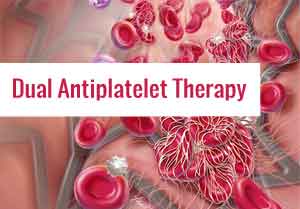- Home
- Editorial
- News
- Practice Guidelines
- Anesthesiology Guidelines
- Cancer Guidelines
- Cardiac Sciences Guidelines
- Critical Care Guidelines
- Dentistry Guidelines
- Dermatology Guidelines
- Diabetes and Endo Guidelines
- Diagnostics Guidelines
- ENT Guidelines
- Featured Practice Guidelines
- Gastroenterology Guidelines
- Geriatrics Guidelines
- Medicine Guidelines
- Nephrology Guidelines
- Neurosciences Guidelines
- Obs and Gynae Guidelines
- Ophthalmology Guidelines
- Orthopaedics Guidelines
- Paediatrics Guidelines
- Psychiatry Guidelines
- Pulmonology Guidelines
- Radiology Guidelines
- Surgery Guidelines
- Urology Guidelines
Can drop clopidogrel three months after PCI in high risk patients: EVOLVE trial

High risk elderly patients who receive Synergy everolimus-eluting stents can, if needed, safely stop taking their P2Y12 inhibitor at 3 months and continue on aspirin alone, according to the single-arm EVOLVE Short DAPT study released today at TCT 2019.
According to the study, shortened three-month DAPT was not associated with myocardial infarction or stent thrombosis in patients at high risk of bleeding who were treated with a contemporary drug-eluting stent.
Findings of the EVOLVE Short DAPT study were presented at the 31st annual Transcatheter Cardiovascular Therapeutics (TCT) scientific symposium.
The required duration of DAPT following implantation of current-generation drug-eluting stent (DES) platforms was not known previously, in lieu of this, the finding provides critically important information. This helps in informing physicians better on the best way to tailor the recommended DAPT duration to the bleeding risk of the patients they treat.
The study utilized a thin-strut platinum-chromium stent (Synergy) that elutes everolimus from an ultrathin abluminal layer of a bioabsorbable polymer. Drug release and polymer degradation are complete within fours months of implantation. These design elements may facilitate endothelialization and enable shorter-duration DAPT than used in pivotal approval trials.
The study involved 2,009 patients at high risk of bleeding (age ≥75 years with bleeding risk outweighing the benefit of DAPT greater than three months, chronic anticoagulation, major bleeding within 12 months, history of stroke, thrombocytopenia, or renal insufficiency/failure) at 110 sites around the world. The study excluded patients with acute MI or complex lesions.
After undergoing PCI, the patients were required to take DAPT (aspirin+P2Y12 inhibitor) for three months, except those on chronic anticoagulant in whom aspirin was optional. Event-free patients (stroke, MI, revascularization, ST) who discontinued the P2Y12 inhibitor at three months, but continued aspirin between three and 15 months, were included in the primary analysis.
Clinical follow-up at three months was 95.2% (n=1,912). Of those, 77.7% (n=1,487) were eligible to discontinue the P2Y12 inhibitor. The analysis population for the secondary endpoint of BARC 2,3, or 5 bleeding was 1,032 due to 455 patients were excluded because they were on anticoagulation.
One co-primary endpoint assessed death or myocardial infarction between three and 15-months post-procedure compared for non-inferiority to a propensity-adjusted historical limus-eluting stent control group receiving 12-month DAPT.
Also Read: Groundbreaking study-High-risk patients may not require long-term aspirin after PCI
Key findings include:
- The event rate for patients who received three-month DAPT (n=1,454) was 5.6% vs. 5.7% in the historical control group receiving 12-month DAPT (n=1,493)
- The second co-primary endpoint of ARC definite/probable ST in patients with three-month DAPT between three and 15 months was also met with an incidence of 0.3% compared to a 1.0% performance goal.
- The secondary endpoint was the rate of BARC 2/3/5 bleeding in patients compared for superiority to the propensity-adjusted historical control.
- The rate of BARC 2/3/5 bleeding in patients receiving three-month DAPT (n=974) was 6.26% compared to 4.17% in the 12-month DAPT group (n=947).
Also Read: Initiate DAPT within 24 hours of minor stroke or TIA For maximum benefit: JAMA Study
"These data better inform physicians on how best to tailor the recommended duration of DAPT to the bleeding risk of the patients they treat," said lead investigator Ajay J. Kirtane, Associate Professor of Medicine, Columbia University Irving Medical Center.
Dr Prem Aggarwal, (MD, DNB Medicine, DNB Cardiology) is a Cardiologist by profession and also the Co-founder of Medical Dialogues. He is the Chairman of Sanjeevan Hospital in Central Delhi and also serving as the member of Delhi Medical Council

Disclaimer: This site is primarily intended for healthcare professionals. Any content/information on this website does not replace the advice of medical and/or health professionals and should not be construed as medical/diagnostic advice/endorsement or prescription. Use of this site is subject to our terms of use, privacy policy, advertisement policy. © 2020 Minerva Medical Treatment Pvt Ltd